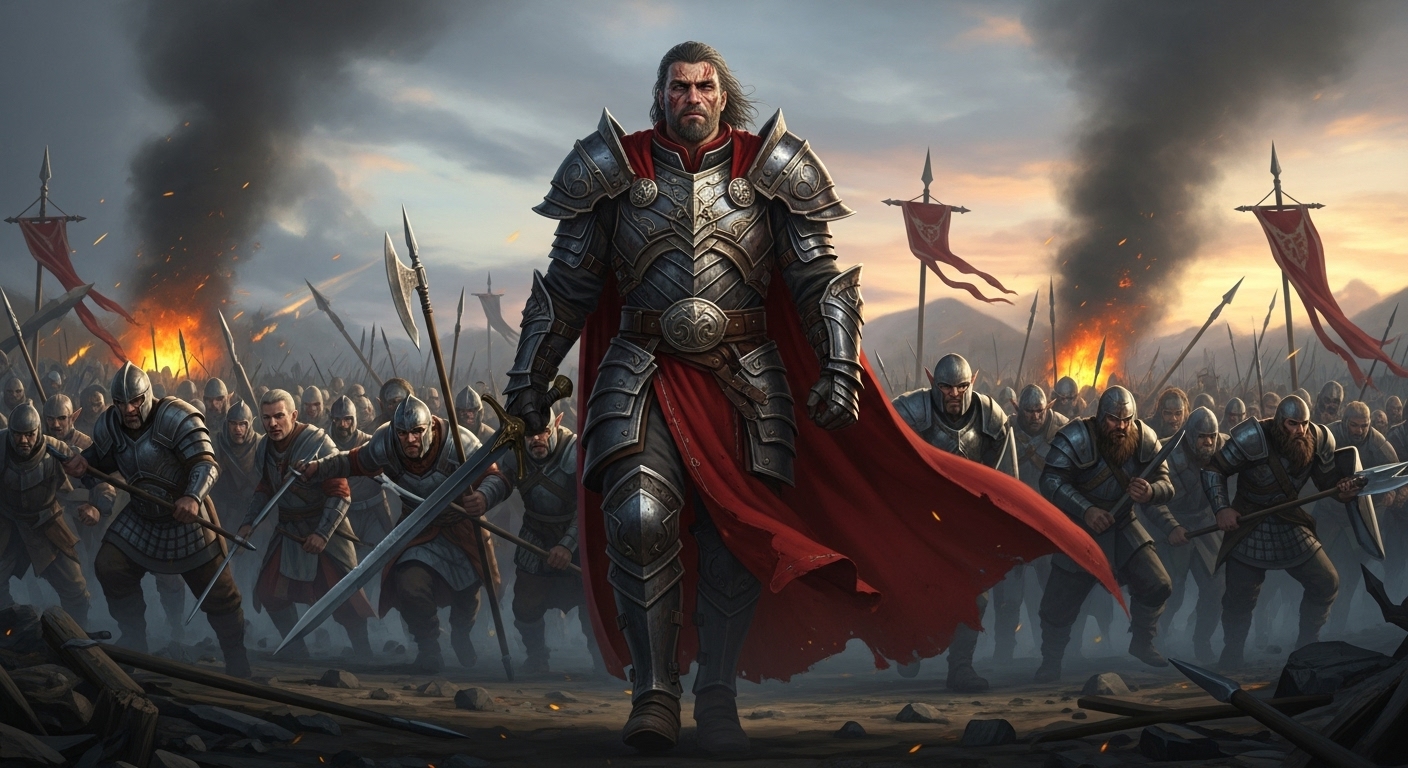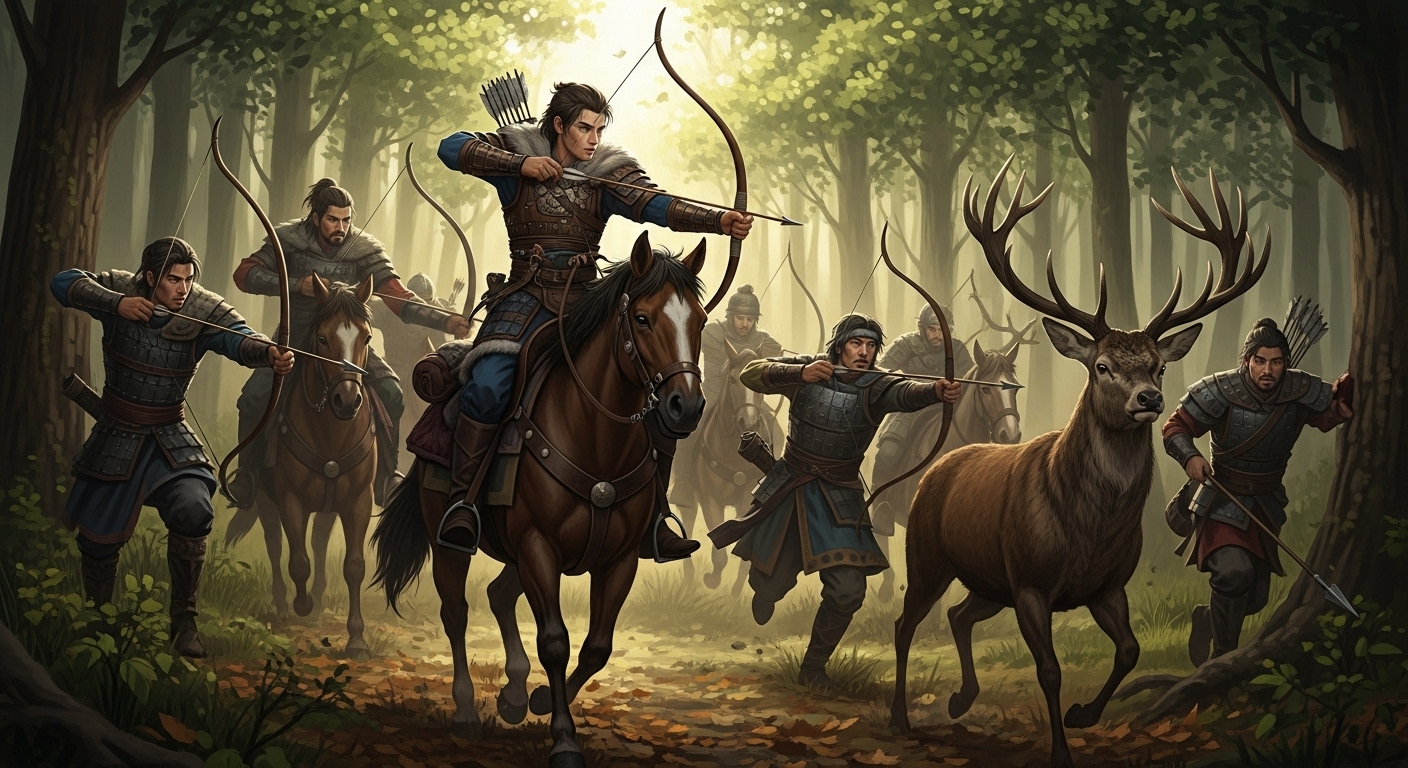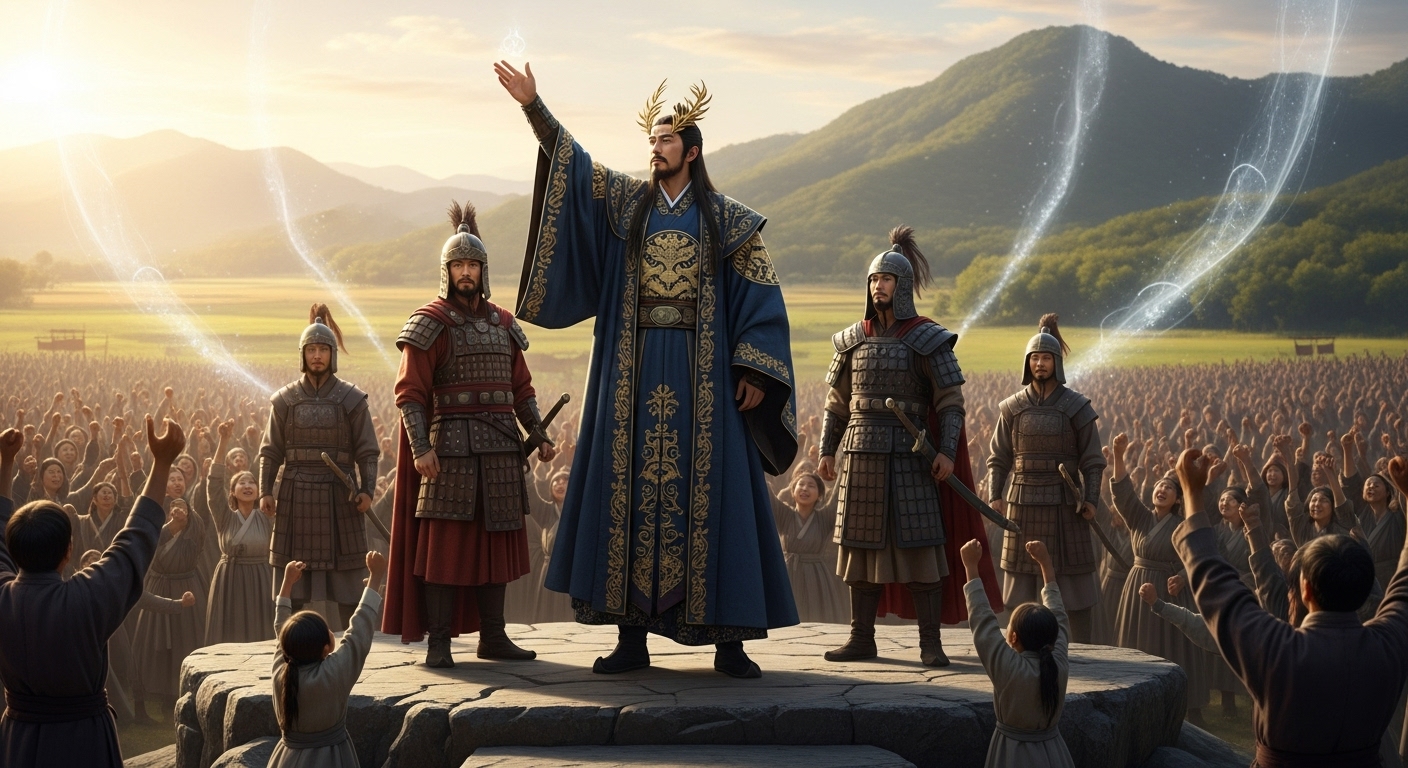Hello, I Ching enthusiasts! Today, let's explore the seventh hexagram of the I Ching, Shi (師), which symbolizes 'The Army'. It depicts water under earth, like groundwater hidden within the soil, representing a disciplined army drawn from the people, emphasizing leadership and order in collective efforts. The hexagram statement is: "Shi: The Army. The army needs perseverance and a strong man. Good fortune without blame."
The line interpretations in the I Ching can be abstract and hard to remember. So, today, I've woven the six lines into an ancient tale to make them come alive. Read the story to absorb the meanings, and then in the breakdowns, I'll quote relevant parts of the story and add annotations from the I Ching original with sources. This way, you'll easily recall the lessons of each line!
숨겨진 세력, 마을 군대의 집결

비옥한 계곡 깊은 곳에는 맑은 샘물이 흐르며 사람들의 삶을 지탱해 주는 평화로운 마을이 있었습니다. 오랫동안 평화롭게 지내던 이곳에도 어느 날 침략자들이 그림자처럼 다가와 위협을 가하기 시작했습니다.
마을의 현명한 지도자 가람은 백성을 지키기 위해 결심했습니다. 그는 마을 사람들을 모아 군대를 조직했고, 질서와 규율을 강조했습니다.
“규율이 없으면 불행이 오지만, 규칙이 있다면 누구도 우리를 비난할 수 없다!”
그의 목소리는 계곡에 울려 퍼졌습니다.

가람은 군대의 중심에 서서 병사들을 이끌었습니다. 그는 군대의 심장이자 정신이 되었고, 그의 리더십 덕분에 군대는 흔들리지 않았습니다. 이 소식은 멀리 퍼져 나갔고, 위대한 왕은 가람의 모범적인 지휘에 감탄했습니다. 왕은 사신을 보내 가람에게 세 개의 훈장을 주며 그의 용기와 지혜를 인정했습니다.

그러나 모든 병사들이 가람을 따르지는 않았습니다. 몇몇 어리석은 병사들은 전장에서 쓰러진 자들을 마차에 싣고 대열에 합류했는데, 이로 인해 혼란이 생기고 군대의 사기가 크게 떨어졌습니다.
가람은 곧 상황을 파악했습니다. 그는 무리한 전투 대신 군대를 왼쪽으로 이동시켜 진을 치게 했습니다. 이 전략은 비난받지 않았고, 병사들은 다시 힘을 되찾을 수 있었습니다.

사기가 회복되자 가람은 병사들의 식량을 위해 사냥을 권장했습니다. 그는 장남 진우에게 사냥을 맡겼습니다. 뛰어난 사냥꾼이었던 진우는 병사들과 함께 사냥을 성공적으로 마쳐 군대의 배를 채웠습니다.
또한 어린 아들 지호는 사냥으로 얻은 식량과 물자를 정리하며 보급을 담당했습니다. 그러나 가람은 아들에게 이렇게 당부했습니다.
“전투는 경험이 필요한 일이다. 젊은이가 서두른다면 불행을 가져올 수 있다.”
그는 지혜는 오랜 경험에서 나온다는 것을 강조했습니다.

마침내 캠페인은 성공적으로 끝났습니다. 환웅 왕자는 가람의 공로를 치하하며 새로운 나라를 세웠습니다. 환웅은 공이 큰 가문들에게 땅을 나누어 주고, 백성이 안심하고 살 수 있는 사회를 만들었습니다.
그리고 그는 마지막으로 중요한 말을 남겼습니다.
“어리석은 사람을 중요한 자리에 두지 말라. 그들의 실수는 나라를 해칠 것이다.”
가람의 지혜와 환웅의 통찰은 새로운 나라의 초석이 되었습니다.
Line Interpretations: Wisdom Linked to the Tale
First Line (Initial Six): An army must set forth in proper order. If the order is not good, misfortune threatens.
This line stresses the need for discipline at the outset of any collective endeavor. Matching part in the tale: "At the start, he insisted on proper order and discipline; without it, misfortune loomed, but with firm rules, no blame fell upon them." This symbolizes establishing structure to avoid chaos. Annotation: I Ching Shi hexagram first line: "The first SIX, divided, shows the host going forth according to the rules (for such a movement). If those rules be not good, evil will befall him."
Image Prompt: "Ancient Chinese vintage poster illustration with ornate borders and all text in English, depicting a leader organizing an army at the beginning with proper order to avoid misfortune, symbolizing I Ching Shi hexagram first line: disciplined outset, valley landscape with forming troops and underground springs, traditional armor in earthy browns and greens for hidden strength."
Second Line (Nine in the Second Place): In the midst of the army. Good fortune. No blame. The king bestows a triple decoration.
This line represents centered leadership in the group, bringing honors and success. Matching part in the tale: "In the midst of the troops, the leader positioned himself centrally, earning good fortune without blame. The king honored him with triple decorations for his exemplary command." Central command yields rewards. Annotation: I Ching Shi hexagram second line: "The second NINE, undivided, shows (the king) in the midst of the host. There will be good fortune and no error. The king has thrice conveyed to him the orders (of his favour)."
Image Prompt: "Classic I Ching inspired art in decorative frame style with all text displayed in English, showing a leader centrally positioned in the army receiving triple decorations from the king, representing Shi hexagram second line: honored central command, troop formation scene with valley and water elements, vibrant golds and reds for recognition."
Third Line (Six in the Third Place): Perchance the army carries corpses in the wagon. Misfortune.
This line warns of mismanagement or improper burdens leading to failure. Matching part in the tale: "However, some troops foolishly carried the dead in wagons, leading to misfortune and disarray in the ranks." Poor decisions cause loss. Annotation: I Ching Shi hexagram third line: "The third SIX, divided, shows how the host may, possibly, have many inefficient leaders. There will be evil."
Image Prompt: "Vintage Chinese folklore illustration with golden borders and all text in English, illustrating an army carrying corpses in wagons leading to misfortune, embodying Shi hexagram third line: mismanaged burdens, chaotic battlefield with wagons and troops, somber grays and blacks for disarray."
Fourth Line (Six in the Fourth Place): The army camps on the left. No blame.
This line suggests a strategic retreat or positioning without fault. Matching part in the tale: "Wisely, the army retreated to camp on the left flank, avoiding direct confrontation, which brought no blame." Prudent withdrawal is blameless. Annotation: I Ching Shi hexagram fourth line: "The fourth SIX, divided, shows the host in retreat. There is no error."
Image Prompt: "Ornate ancient poster style depiction with all text in English, portraying an army camping on the left flank strategically without blame, symbolizing Shi hexagram fourth line: prudent positioning, camp scene in valley with earth and water motifs, calm blues and browns for safety."
Fifth Line (Six in the Fifth Place): There is game in the field. It furthers one to catch it. Without blame. Let the eldest lead the army. The younger transports corpses; Then perseverance brings misfortune.
This line advises proper delegation: elders lead, youth support; mismatching roles brings ill. Matching part in the tale: "When game appeared in the fields, the leader encouraged capture without blame. He let the eldest son lead the hunt, while younger ones handled logistics; but if the young led combat, perseverance would bring misfortune." Right roles ensure success. Annotation: I Ching Shi hexagram fifth line: "The fifth SIX, divided, shows birds in the fields, which it will be advantageous to seize (and destroy). There will be no error. If the oldest son leads the host, and younger men (idly occupy offices assigned to them), to whatever perseverance he may advance, there will be evil."
Image Prompt: "Traditional Chinese art with intricate patterns and all text displayed in English, showing game in fields with eldest leading the army to capture without blame, but younger handling corpses to avoid misfortune, representing Shi hexagram fifth line: proper delegation, field hunt scene with troops, dynamic greens and yellows for opportunity."
Top Line (Six at the Top): The great prince issues commands, Founds states, vests families with fiefs. Inferior people should not be employed.
This line describes post-victory rewards and caution against using unworthy individuals. Matching part in the tale: "At the campaign's end, the great prince issued commands, founding states and granting fiefs to worthy families. He warned against employing inferior people in key roles." Reward the deserving only. Annotation: I Ching Shi hexagram top line: "The topmost SIX, divided, shows the great ruler delivering his charges, (appointing some) to be rulers of states, and others to undertake the headship of clans; but small men should not be employed (in such positions)."
Image Prompt: "Dramatic vintage I Ching illustration with bordered frame and all text in English, depicting a great prince issuing commands and granting fiefs, avoiding inferior people, symbolizing Shi hexagram sixth line: wise post-victory governance, royal scene with states and families, majestic purples and golds for authority."
This blog should make the six lines of Shi hexagram feel more approachable! The I Ching is full of life wisdom. Share your thoughts in the comments. See you next time
'사서삼경' 카테고리의 다른 글
| Ninth Hexagram : The Wisdom of Small Taming (2) | 2025.09.11 |
|---|---|
| Eighth Hexagram : The Wisdom of Holding Together (0) | 2025.09.10 |
| Exploring I Ching's Sixth Hexagram Song with an Ancient Tale: The Wisdom of Conflict (0) | 2025.09.08 |
| 수천수 : 기다림의 지혜 (2) | 2025.09.07 |
| 산수몽 : 무지에서 깨달음으로 (0) | 2025.09.06 |



